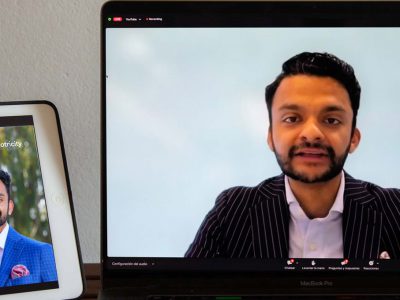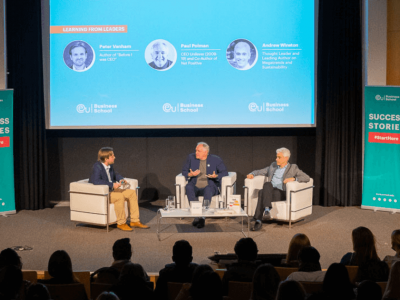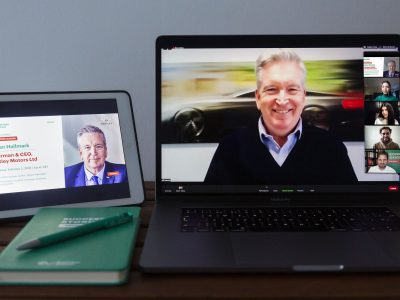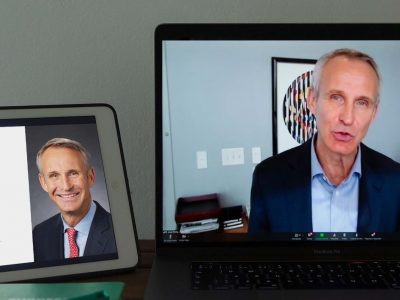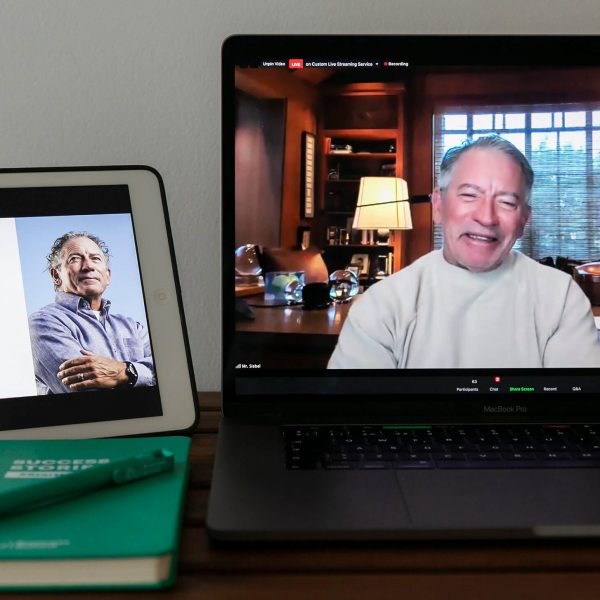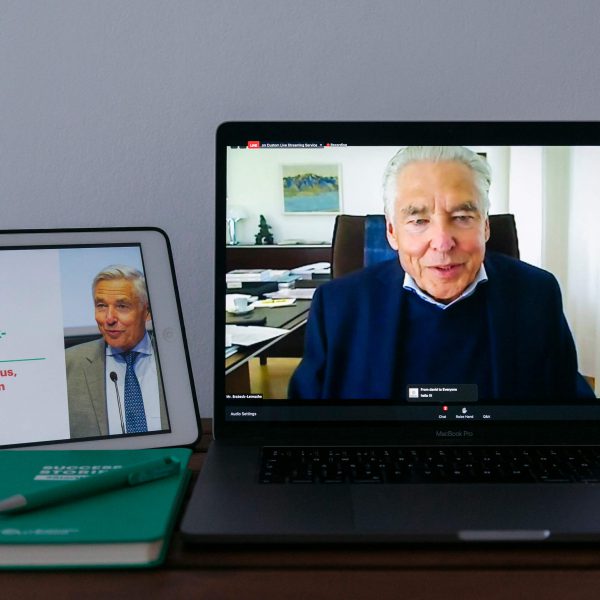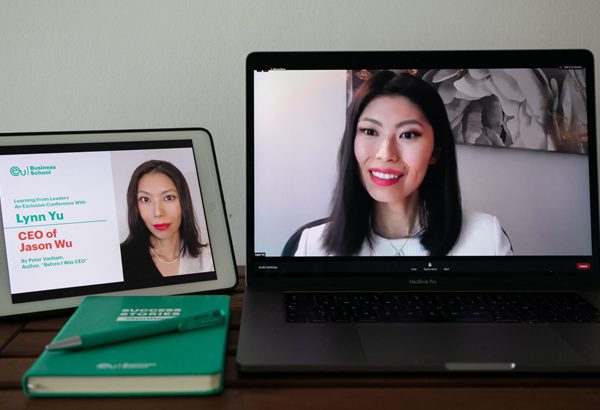Insights From Zev Siegl, Co-Founder of Starbucks & Startup Mentor
At EU Business School, entrepreneurial spirit is in our DNA. So it was a great delight to welcome Zev Siegl, Starbucks co-founder and self-confessed startup man, to our Learning From Leaders conference series.
From sharing the founding story of the now iconic Starbucks, to offering essential advice for entrepreneurs, the warmth which Zev brought to this fascinating conversation with Peter Vanham, author of “Before I Was CEO”, was appreciated by everyone in attendance. Sharing interesting anecdotes, his thoughts on crucial topics including equality and sustainability, and insights to help entrepreneurs learn from his incredible success, Zev’s sincere and open manner demonstrated the generosity which marks a true leader.
You can view the full event here. In the following article, we’ve outlined moments of the conversation which will inspire and inform anyone wishing to start their own enterprise.
Be Assertive: The Founding Story of Starbucks
The founding story of Starbucks demonstrates that, with the right combination of determination, curiosity and careful research, anyone can create their own success.
Zev recalled that he and his co-founders, Jerry Baldwin and Gordon Bowker, “Started meeting kind of formally to see if we could come up with a way to improve our lives that would give us more from life than the first jobs we had after graduating college. We just wanted something more interesting.”
Their rigorous approach involved generating, researching and discarding many ideas until August 1970 when the trio went for lunch and were offered an espresso by the waiter. In Seattle at the time there was no coffee scene; no one had an espresso machine. This caught the attention of the three would-be-entrepreneurs. When it came, the coffee was awful and “Does Seattle have to live with bad coffee?” became the spark that started Starbucks.
In 1970 there was no internet; research had to be done at the library. It was there, looking through a phone book, that Zev discovered Peet’s Coffee in San Francisco. As every entrepreneur should, Zev said: “I did the right thing, I was assertive and called someone who I thought would be an expert.” That bold step paid off. Not only did Mr. Peet invite Zev to visit his roastery and retail store with its small coffee bar, he took Zev to dinner and offered to coach him and his business partners through setting up their coffee company. That was a life-changing moment.
Zev admitted that although Starbucks would have been created without Mr. Peet’s support and advice, it would not have had the quality standards that it does today. “Mr. Peet was old-school”, Zev commented. We have him to thank, at least in part, for the ubiquity of Starbucks today.
Before they could register the company, the trio had to come up with a name. Their attorney was pressing them, because the paperwork needed to be submitted, so, in the end, ‘Starbucks’ was an impulsive choice born of a hurried discussion. The aim was to create a brand that people felt had been around forever, and the name Starbucks evoked that sense of history. Although it’s since been updated, the modern logo evolved from the original design and still bears the same, central mermaid figure.
Growing and Selling a Successful Company: The Entrepreneur’s Goal
Entrepreneurs’ stories all have one common denominator: a lot of hard work. Comparing his experience to the journey of a modern tech startup founder, Zev said: “You do what’s called sweat equity, you compose the code at night and at weekends when you are not working at your day job”. Zev, Gordan and Jerry did everything they could themselves, including fitting and painting the first store.
In their second year they started to expand. Despite having run out of money, Starbucks was doing well and some local investors agreed to finance the expansion in exchange for 15% in stock. They were the only investors the founders took on. By staying within Seattle, Zev, Jerry and Gordon were able to continue to grow by reinvesting profits and borrowing against their inventory. Competition at the time was low; the commercial coffee they were up against was terrible and, once a customer was in the shop, they were sure to be converted.
Originally, Starbucks was a retail store for coffee beans. They only brewed coffee as a sales technique to demonstrate the quality of their product. As well as selling direct to consumers, they supplied local restaurants with beans. By displaying “coffee by Starbucks” on the restaurant menus, many new customers were introduced to the brand. Although Zev reflected that they could have started their own coffee bars sooner, it was a highly effective strategy.
After ten years of growth, Zev decided to sell his shares in the company. He’d been opening new divisions of the Starbucks business which simply weren’t as profitable as their core product. When his partners approached him and asked him to stop, he realized that he couldn’t. He reflected: “I am a startup guy and I know who I am. I am an early stage entrepreneur; I have been all my life.” If he’d stayed at Starbucks, he’d have felt driven to continue working on new things which was not what the company needed to grow. Gordon and Jerry bought him out and Zev started on his next venture.
Meanwhile Howard Schultz, now the longstanding chair of Starbucks, was working for one of their suppliers. On a visit to his clients, Howard’s intrigue in the dynamic young brand led to his appointment as their new Vice President of Sales and Marketing. It was, Zev remarked, “a very good hire”. And much of the success of the brand today can be attributed to Howard’s leadership. During a now infamous trip to a trade show, he found that “in Italy, you could get an espresso on every corner”. He decided the company needed to pursue brewed coffee as a central part of their strategy, moving away from their retail focus. He found angel investors who believed in his vision and discovered that Jerry and Gordon were ready and willing to sell.
It is Howard who is responsible for growing the brand into the Starbucks that is globally known and loved today. Although this has been compared to the McDonald’s brothers’ story, Zev was quick to point out the difference. While the McDonalds brothers reportedly felt cheated in the sale of their now-global fast-food business, Starbucks’ founders did not feel the same at all. Zev said, “I feel really happy, it’s like seeing your child turn into the one of the best people in the world. The impact on myself and on the rest of the world of Starbucks is a positive one. And I am thrilled that a man like Howard Schultz was present and wanted to do this.”
Zev is content with the success of Starbucks: “I am not a person who is very comfortable in a company with a hundred employees, let alone thousands. I am good at the early stage; putting things together, financing, but I am not good in a large organization. […] If you know who you are – and I do, I know who I am – you can be content if you are following your own life plan.” It’s a valuable piece of advice for budding entrepreneurs; know yourself, know your strengths and your true interests. If they guide your decisions, you won’t feel regret.
So, while Starbucks grew under the leadership of Howard Schultz, Zev was able to pursue the path that most interested him: working with and supporting other entrepreneurs: “I work with a considerable number of young entrepreneurs and I get to hear their stories. They’re my teachers, and they’re now in many countries”. Zev’s skill in this area is evident from his ability to pinpoint errors made during the early days of Starbucks, as well as identify business development avenues that could prove profitable for the company now.
Learning From Failures and Identifying Missed Opportunities
Perceptive questions from EU students drew out insights from Zev on mistakes the company made in the early days, and opportunities he thinks they’re missing now.
“I have been mystified why Starbucks has no presence at all in the world of chocolate”, he said. It makes sense – coffee and chocolate are industries that pair perfectly and that require similar expertise. He is, however, impressed by the continual product development in the lab Starbucks keeps in Seattle: “They’re still able to develop new coffee products which really amazes me. You’d think after 400 years of coffee there’d be nothing left to develop!”
Reflecting on the first few years of the business, Zev recalled three mistakes that provide useful learning opportunities for entrepreneurs:
- One of their earliest aims was to get high quality coffee onto supermarket shelves. They created a sub-brand, Blue Anchor Coffee, and persuaded two local chains to let them install their coffee in-store. “A smarter more experienced entrepreneur would have seen this coming”, he said, “but we did not”. Once they had their products on display, having made an investment to do so, the supermarkets started to press them to decrease their prices. “We were operating efficiently but the coffee we had was really expensive”. Eventually they had to sell the brand because they “could not play the price game with supermarkets”. Understanding the goals of potential business partners is key to successfully navigating business growth.
- The second mistake he recalled was a significant error in financial forecasting. The founders estimated that their fine leaf teas, sourced from around the world, would represent 15% – 20% of their total sales. The actual number was just 2.5%, which meant warehouses were left full of tea. Thankfully they were able to sell off their excess stock.
- Thirdly, Zev said: “I have been asking myself, could we have been opening coffee bars in 1976? And I think the answer is, we probably could have.” Starbucks did not start experimenting with coffee bars until 1981. Prior to that, they’d been supplying beans to the first coffee bars and carts in the city, which is why they’d decided not to pursue that line of business.
Knowing when to take a risk, forecasting accurate sales figures and anticipating external pressures on your business model are all complex but key skills a startup founder needs to master.
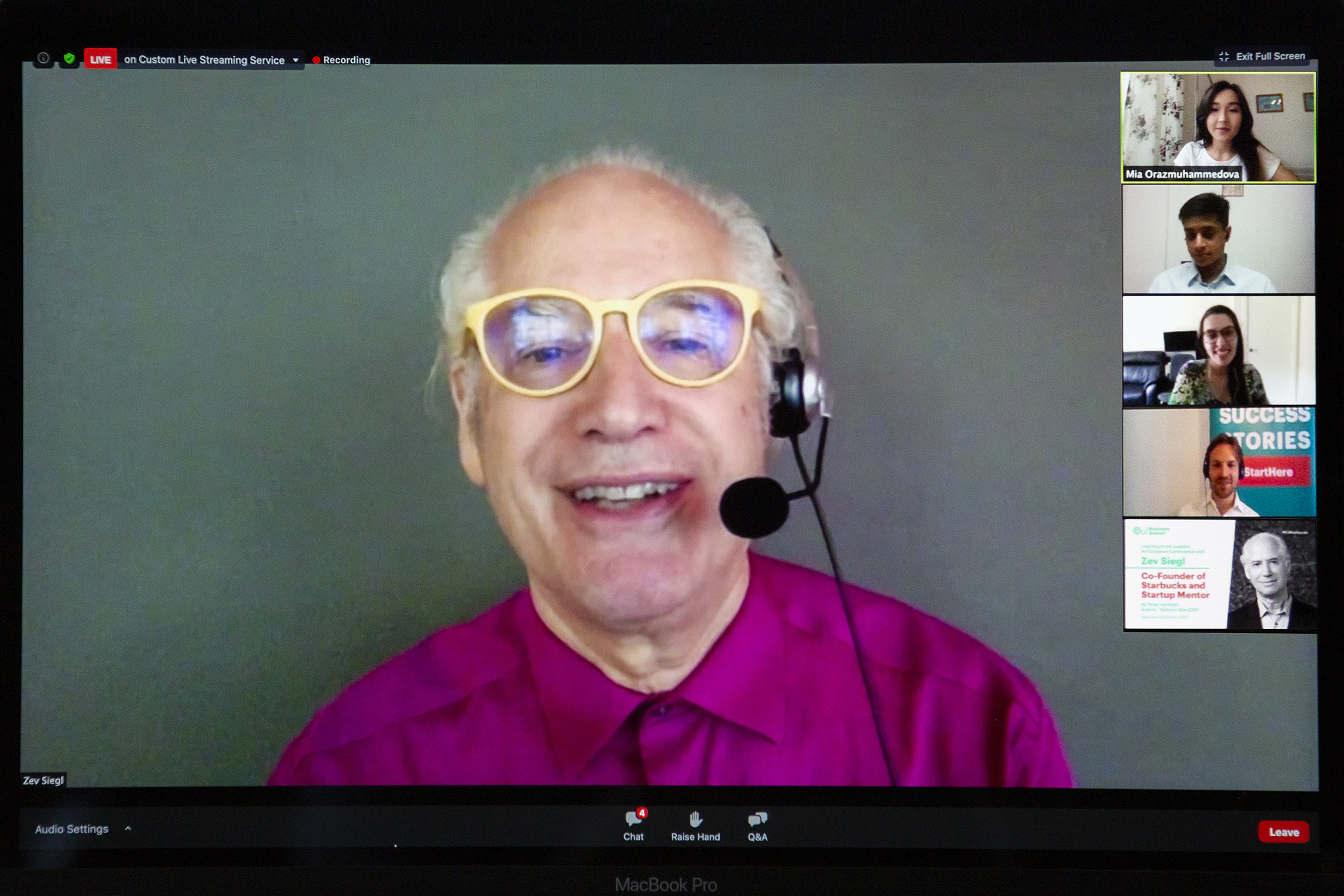

Entreprenurial Advice From Mr. Startup
Throughout the conversation Zev shared advice from his long experience as an entrepreneur and mentor. These are some pearls of wisdom every startup founder should take note of:
- First, identify demand. You need an idea that has a market. One of the most effective approaches is to identify your target customer’s pain points. What is causing them trouble? How can you fix it?
- Know yourself; identify where your skills and interests lie and work to your strengths. Fill in key gaps by finding business partners or consultants who can offer missing expertise.
- Determine what’s driving you: “There are three main reasons that people start companies: the feeling you could do well for yourself financially; a vision – I would call that an insight into an industry; and self-actualization. A lot of people who want to start a company want to have the experience of creating something.” All are equally valid, but it is useful to know where you are coming from.
- Be a good listener: “If you find that you are having conversations with people about your business idea and the other person does all the listening, that’s probably not a good sign. The entrepreneur needs to have a certain level of assertiveness and good ideas, but they also need to have the ability to listen.”
- Exceed customer expectations. Get ahead of the competition and then go above and beyond to offer your customers exceptional service, especially when things are tough. This will generate loyalty and positive word-of-mouth publicity.
- Pay attention to financial forecasting: “This is really significant and it’s something that I have learned over many years”, Zev said. “Always know what your financial position is. If you are not a numbers person you need a consultant or person who is. It’s not okay to begin a company and take money from your family and later from angel investors and not have a deep understanding of how financial spreadsheets work.”
- Look after your colleagues and employees: “Being your own boss doesn’t mean being a dictator to the people around you, it means listening to them and thinking about their needs – your partners, your staff and your customers.”
- Find business partners that complement your skill set. Reflecting on the partnership between Jerry, Gordon and himself, Zev said: “We got on very well. I think our ability to cooperate and to listen to each other was really important […] We were a little bit lucky because, as it turned out, I was a very good startup person; I could handle a lot of tension and do a lot of things at the same time. Gordon Bowker was a very deep thinker about how to position a company in a marketplace and he did that for other companies too, and then Jerry Baldwin evolved into an excellent leader and a fabulous financial executive. So we had a lot of important areas covered from early on, and Starbucks looked pretty good to our customers because of that.”
It also became apparent throughout the conversation that companies should have good values. Not only because the mark they leave on the world should be positive, but because it makes good business sense.
Corporate Social Responsibility and Business With Conscience
Although Zev has not been at the helm of Starbucks since 1981, it was interesting to hear his opinion on how the brand handled criticism it faced for racism after a nervous store manager called the police on two African American customers, who she thought were loitering. They were, in fact, waiting for a friend to join them for coffee. The reaction of the business was strong and immediate. 8,000 stores across America were closed on the same day for urgent staff training on racial bias. It was characteristic of Chair Howard Schultz, Zev commented, who is known for his liberal, progressive and inclusive approach. The reaction came from the heart, Zev said, but was also remarkably good marketing: “This is corporate social responsibility of a high order.”
Linking that earlier incident to the Black Lives Matter movement, which is very present in Seattle, Zev remarked: “This is one of those wonderful moments in which doing the right thing is actually good for business, so I expect a lot of corporations to make changes.” He explained: “Equal opportunity in education and in employment is where we have got to go.” “It’s going to be painful for people of privilege […] we have advantages that many people don’t due to their economic situation or their race. We are just going to have to persuade those in power to give more to the people lacking the power to get what they need.”
Sustainability is another hot topic in the world of coffee. “It is a tragedy that there still isn’t a widely available to-go cup that can be recycled”, Zev noted, adding that was a job for enterprising students: “The EU graduate who solves that problem is going to make a fortune!” The coffee industry has a tremendous problem with environmental compliance; it’s largely a to-go industry and generates an astonishing quantity of un-recyclable waste. There is, however, brilliant work being done at the start of the supply chain, eliminating the use of chemicals in coffee agriculture. And Starbucks started using recycled products in their interior design 15 years ago, as part of their commitment to a more sustainable industry.
When it comes to sustainability and corporate social responsibility, particularly for businesses catering to millennial and Gen Z audiences, initiatives that have a positive impact on the world are also valuable marketing opportunities. In this period of global flux, companies that demonstrate they’re working towards building a better tomorrow will have a competitive advantage.
Opportunities for Entrepreneurs Post COVID-19
There’s no doubt that the game has changed for business owners and entrepreneurs; coronavirus has shifted the economy. Zev helpfully highlighted some opportunities this presents for savvy professionals looking to start their own business.
“The game has changed. There are a number of things that are still possible now. Most businesses that have to do with a product that’s sold online, a software product or a phone application are going ahead. […] The other aspect is assets are going to be available at extremely low cost, so it is going to be possible to acquire existing businesses of all types – distributorships, retail – all kinds of companies, and grow them after the virus has been managed with a vaccine. […] I recognize that means that somebody else has had to give up their assets at a price far lower than expected, but it is a reality. Also, I would advise anyone, especially a startup, to think in terms of a niche; a narrow area that has been overlooked.”
Once you start looking, there are plenty of innovative new markets and thriving existing industries that present valuable opportunities for graduates and entrepreneurs. For more ideas of business areas that’ll remain profitable in the future, explore the other blogs in our Learning From Leaders series.
Start Your Startup Journey Today
Whether you are interested in founding your own business, repositioning an existing company or finding your niche in a competitive global industry, your future starts here. To succeed, you will need a thorough grounding in business expertise and insights from the forefront of innovative business. Which is what we offer at EU Business School. For an international, experiential and flexible business education, we encourage you to explore our internationally accredited programs.



